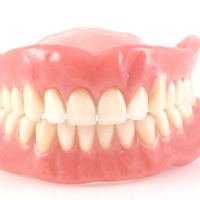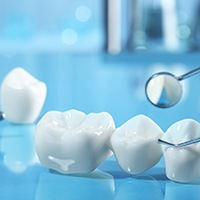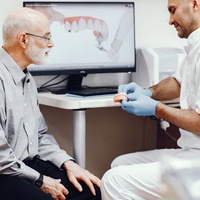


When you’re missing several teeth (or all the teeth in a given arch), your life is far more likely to be affected by numerous inconveniences. Not only is it difficult to show your smile to those around you, but eating your favorite foods can become an impossible task. Even your facial appearance can start to take a toll as your jawbone begins to break down. If you have remaining teeth, you may start to notice them shifting out of place, resulting in long-term issues with your bite and smile’s alignment. With natural-looking and highly functional dentures and partials from Dr. Stephen Dean, you can address these issues directly when you give our office a call!

Tooth loss is incredibly common, affecting one in six American adults annually with one in eight missing all their teeth. Whether you’re missing a couple of teeth or an entire arch, dentures from Dean Dental Care could be a fantastic solution for you. But how do you know if these prosthetics fit your needs? Read more below to see the traits of a great denture candidate. Afterward, if you decide that now is the time to see Dr. Dean for your denture consultation, give us a call!

Tooth loss can occur for any number of reasons from physical trauma to severe tooth decay or gum disease. However it happens, the results are the same—a lower quality of life. Here are some issues you may face with missing teeth:

For patients with tooth loss, there’s good news: almost anyone can have dentures! However, the best denture candidates have three distinct qualities:
There are several types of dentures to choose from, but ultimately these factors, as well as the number of teeth you’re missing, will help determine which prosthetic is right for you and your needs.

Of course, dentures aren’t your only option when it comes to tooth replacement. If you decide that dentures aren’t right for you, you may choose a different treatment, such as:
A Dental Bridge: This option requires healthy teeth on either side of the gap in your smile. These healthy teeth are shaped into “posts” and fitted with dental crowns that hold a false tooth called a pontic between them.
Dental Implants: These are small titanium rods that are surgically implanted into your jawbone. Over time, the implants fuse into the bone and are used to support restorations like crowns, bridges, or even denture prosthetics!
Learn More About Dental Bridges
Learn More About Dental Implants

There are generally two types of traditional dentures available. This includes full dentures and partial dentures.
Full dentures are designed to replace all the teeth in your top arch, bottom arch, or both, depending on your needs. Full dentures are made from a gum-colored base and porcelain teeth, ensuring a natural-looking appearance when worn. They stay in the mouth via natural suction, which is why personalizing them to fit your mouth exactly is so important. Full dentures are ideal for those with severe tooth loss and can last for many years when properly cared for.
Partial dentures are different because they are only meant to replace specific teeth on opposite sides of your mouth. This means they act like a puzzle piece in your smile. Via metal hooks, partial dentures wrap around existing teeth to stay in place. This means they often have superior stability compared to full dentures, which only rely on natural suction and adhesive to stay in place.
Regardless of the denture you need, they both make it easy to smile, expand your diet, and prevent neighboring teeth from shifting out of place!

Dentures offer one of the most versatile solutions for replacing missing teeth, and it’s easy to see why! These prosthetics can be customized specifically to address your unique situation, meaning their size, shape, and color will be made to best match your smile. What exactly are they made out of? What are the steps involved to develop the new teeth you’ll come to enjoy? Read on to learn how dentures are constructed as well as ways to make your adjustment period with them much smoother.

First things first, dentures mainly consist of two components:

Dentures involve a multi-step process that can generally be completed after a couple of weeks. Here’s a brief look at the steps:

Getting used to your dentures may take an adjustment period. It’s normal to experience some soreness during this time, but this is often temporary. You might also find it challenging to eat and speak effectively. With some time and practice, your dentures should begin to feel more natural, meaning you’ll be able to enjoy most of your favorite foods and speak like normal. If you do notice anything unusual with your prosthetics, be sure to notify our team so we can help address the issue.

Dentures are a life-changing tooth-replacement option for people who have suffered from extensive tooth loss. They can restore the appearance and function of your teeth. Read on to learn about some of the amazing benefits that you can experience by replacing your missing teeth with dentures.

If you don’t currently have any healthy teeth, it can be difficult to accept. Many people who have lost most of or all of their teeth encounter negative effects on their self-confidence, resulting in higher levels of sadness and depression. When you restore your smile with dentures, you can feel better about your image, reducing anxieties regarding your appearance, speech articulation, chewing ability, and much more.

When you have gaps in your smile, it can be challenging to pronounce certain sounds and different words. To enunciate your words properly, your lips and tongue need to be positioned properly. If there are gaps in your smile, your tongue can’t touch the teeth, making some words very challenging to say. Dentures act as your missing teeth, giving you the ability to speak more clearly.

Many nutrient-dense foods are tough in texture. This includes healthy proteins, fruits, and veggies. If you are unable to chew your food thoroughly due to tooth loss, this can negatively affect your eating habits, ultimately resulting in poor dietary choices and indigestion. When you have dentures, you can chew more easily, giving you the freedom to enjoy an expansive diet.

If you have healthy natural teeth, dentures can help to keep them in great shape. By filling in the gaps with a partial denture, you can keep the surrounding teeth from shifting around. Dentures also help to bear some of the weight of regular biting and chewing, limiting the wear and tear of your natural teeth.

When attending interviews, negotiating sales, and attending goal events, it’s important to make an excellent first impression. Because your smile is one of the very first things that people notice about you, having a healthy-looking smile will do nothing but help. In fact, studies show that the probability of being employed is negatively associated with having poor oral health.

Depending on the type of denture you need to replace teeth and the complexity of your tooth loss, your costs can vary considerably. No matter what you end of needing to pay for your future denture, Dr. Dean and his team will explain your cost estimates ahead of time so you can make an informed decision and avoid any surprise fees. With that said, you can find the most notable factors that will influence your costs below.

The most notable factors for determining the cost of a denture includes the following:
Remember that finding the cheapest denture is not always ideal. Very cheap dentures are more likely to be made from subpar acrylic materials. For something that’s going to be inside your mouth most of the time, it’s worth making quality a priority.

Implant dentures require the placement of dental implants beforehand. While this makes treatment more expensive, it’s for a good reason. By using dental implants to hold your restoration and not just neighboring teeth or natural suction from the gums, you achieve a more permanent, lifelike solution to your severe tooth loss. There’s no risk of your denture slipping out of place, you can eat the foods you want, and you won’t need to replace your teeth every five to seven years (like with traditional dentures). Implant dentures can last several decades before needing any type of replacement as long as you take good care of them.

Widely considered a major procedure among most dental insurance providers, dentures generally receive around 50% coverage from many insurance plans. However, this is not guaranteed, so it’s important to check with your insurance provider directly to ensure you get coverage. Our dental team is happy to discuss your plan’s benefits with you one-on-one and confirm what’s available to you ahead of your treatment.

If you don’t have dental insurance at this time, there are other options for you to consider as well. At Dean Dental Care, we recommend third-party financing options to make your care not just more affordable, but easier to manage in the long-term. This includes CareCredit, a financing option that let you make monthly payments on dental services with little to no interest attached. This makes even the most expensive treatments affordable enough to fit into a monthly budget, especially when taking care of a family. If you’d like to learn more about options to finance your care, please give us a call to schedule a consultation!

Since your dentures serve to restore the function and appearance of your smile after tooth loss, you’ll probably want to do what you can to help your appliance last for as long as possible. Luckily, there are a few easy measures you can take to ensure that your restoration stays in great shape. While it’s still important to visit our office in Covington regularly if you wear dentures, proper oral hygiene and denture maintenance at home are crucial aspects of preserving your smile. Here are a few habits to keep up with so your appliance can stay beautiful and in working order for up to ten years.

Always rinse your dentures with cool or lukewarm water after each meal to eliminate sugary residues and food debris that can lead to oral infections and bad breath. Take care to never use hot water, as this can warp the acrylic in the base of your appliance and ruin the way it fits.
Once a day, remove your dentures and clean them with a soft-bristled toothbrush and a little bit of mild dish soap, unscented hand soap, or denture cleanser. Don’t use regular toothpaste, as this can leave unsightly scratches in the artificial teeth. Instead, use gel toothpaste that is much less abrasive. If you’re not putting your dentures back in right away, soak them in a container of water or an approved denture-cleansing solution so they don’t dry out and warp. Remember to rinse your dentures after soaking them before you replace them in your mouth, as denture cleaning products are not meant to be swallowed.
Before cleaning your dentures, fill your sink with cool or lukewarm water and place folded towels across your countertop to create a cushion in case you drop them. Always remember to keep your appliance out of the reach of children and pets.
It’s important to remove your dentures for at least eight hours a day so your gums can rest and your mouth can clean itself, and failing to do so can lead to irritation, bad breath, oral infections, and a higher risk of pneumonia. Most patients remove their dentures before going to bed. When you take your dentures out for the night, soak them in an approved denture-soaking solution to keep them from drying out and losing their shape.
Regularly inspect your mouth and dentures and take note of any changes so you can point them out to your dentist during your next appointment. Issues to look out for include gum irritation, oral sores, or signs of infection. Never try to repair damaged dentures on your own, as you may damage them further or injure yourself. Instead, give our office a call so we can see if your appliance needs to be adjusted, relined, or replaced.

Whether you have never worn a full or partial denture before or you need a refresher since you received your previous prosthetic, Dean Dental Care is happy to answer any questions you might have. We want you to be as informed as possible when it comes time to receive your new tooth replacement, so don’t be afraid to ask questions or request clarification on a specific phase of your treatment process. Below, you’ll find some of the most common questions we’ve heard over the years answered for your convenience. Read on or give us a call today to learn more about dentures in Covington.
The typical amount of time needed before dentures can be placed is about six to eight weeks. This wait will ensure your gums have time to heal and give your mouth time for the denture to fit properly. However, this timeline can vary depending on what type of denture you are receiving. For example, same-day dentures enable you to receive a denture on the same day as your extractions. Alternatively, implant dentures require dental implants placed inside of the jaw to heal over the next four to six months before a permanent denture can be attached.
We strongly recommend removing your denture before going to bed. When you first receive your denture, you’ll be told to keep it inside your mouth for the first 24 hours to help your mouth adjust. However, after that period has passed, you’ll want to remove it before going to bed. If you wear your denture for too long, your soft tissue can become irritated as blood circulation becomes restricted in your gums. By removing them, you give your gums a chance to recover and get the nutrients they need. Wearing a denture for too long also promotes bacterial growth.
In certain cases, tooth extraction is necessary to make room for a new denture. Some mild discomfort is normal following this type of procedure and can be managed easily with prescribed pain medication used as directed. Discomfort should improve over the next few days. When you receive your denture, minor irritation is common as your mouth begins to adjust. The amount of time needed to adjust will vary from person to person, but it can take between a few weeks to a few months. Should you switch to new dentures, your adjustment process could be longer. If you fear the denture does not feel quite right or your symptoms do not improve, call us.
It will take a little time for you to speak confidently with dentures since you are more used to speaking with natural teeth. However, with enough practice, you’ll begin to adjust and your lisp will eventually go away. The adjustment period varies from person to person, but doing things like reading out loud or to yourself can be a good exercise. Try to speak slowly as fast speech can sound muffled if you aren’t used to wearing dentures. Try biting down and swallowing before you begin talking to ensure your denture remains in position. Use denture adhesive as needed, but avoid using it outside of your adjustment period.
Our priority is to preserve as many of your natural teeth as possible. For this reason, we’ll always prefer to repair a damaged or compromised tooth before considering replacing it altogether. We will only recommend undergoing tooth extractions as a last resort or when completely necessary for preserving your oral health. For instance, we’ll typically need to pull a tooth that’s beyond repair due to severe infection, extensive decay, or most of the enamel has been broken off.
If your pearly whites in an entire arch have been infected or decayed from gum disease, replacing them altogether with dentures might be more cost-effective compared to saving each with a crown. While there isn’t a limit to the number of teeth we can remove in a single visit, some extractions are more challenging than others. Our team will walk you through your options before suggesting pulling out any of your teeth for dentures.
Although dentures will restore your bite and smile functions, you’ll still have to be cautious about the foods you eat. For instance, you may need to minimize or avoid hard foods like nuts, corn on the cob, carrots, apples, and popcorn. These snacks can potentially damage, wear down, or dislodge your dentures. Tough meats such as steak or pork chops will usually require excessive chewing, which can place too much stress on both your restorations and your gums. Foods that are gummy or sticky can end up pulling your dentures off or shifting them out of place. Additionally, certain meals may consist of smaller pieces that can get trapped underneath your restorations, irritating the gum tissue.
Whenever you are missing teeth, the jawbone will not have enough stimulation to be preserved. Over time, your facial muscles will begin to shrink, resulting in a more aged or shrunken appearance. With dentures, you’ll be able to offer some support to your bone structure, which can improve your look. Ill-fitted ones, however, will not provide sufficient stability for your facial muscles, which is why it’s crucial to receive restorations that fit seamlessly in your mouth. If your dentures ever begin to feel like they don’t fit properly, then it’s time to get them adjusted or replaced by your dentist.
Bacteria is the main cause of bad odors in the mouth. They can get trapped and accumulate in multiple areas of your smile, including your dentures. The less fitted your restorations are, the higher the chance of food particles and bacteria getting stuck underneath them. Dentures that move excessively can also irritate your soft gum tissues, which can result in sores and infections that contribute to bad odors. Those with this tooth replacement option tend to produce less saliva, potentially leading to dry mouth that allows harmful and smelly bacteria to thrive. To avoid bad breath, make sure to clean your dentures frequently (as well as your entire mouth) and soak them in a cleansing solution overnight to keep them bacteria-free!